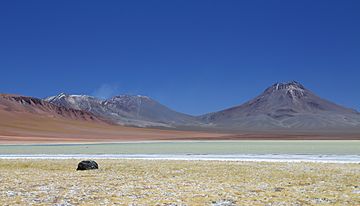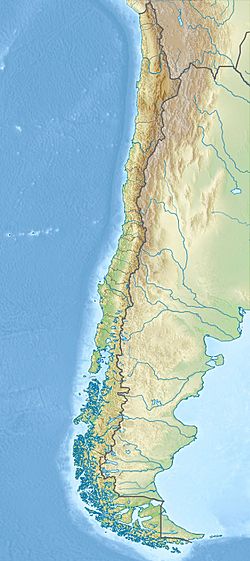Aguas Calientes (volcano) facts for kids
Quick facts for kids Aguas Calientes |
|
|---|---|
| Cerro Aguas Calientes | |

Aguas Calientes on the right. The ridge on the left foreground is Cerro Corona. Behind it Lascar.
|
|
| Highest point | |
| Elevation | 5,924 m (19,436 ft) |
| Listing | List of volcanoes in Chile |
| Geography | |
| Location | Antofagasta, Chile |
| Parent range | Andes |
| Geology | |
| Mountain type | Stratovolcano |
Aguas Calientes Volcano, also called Cerro Aguas Calientes or Simba, is a tall, cone-shaped stratovolcano in Chile. It's located about 5 kilometers (3 miles) east of the Lascar volcano. It is also about 10 kilometers (6 miles) north of Laguna Lejía.
This volcano is made of volcanic rocks called andesite and dacite. These rocks contain minerals like hornblende. The rocks from Aguas Calientes are older than those from the nearby Lascar volcano. The volcano itself is about 7 kilometers (4.3 miles) wide.
Contents
How Aguas Calientes Formed
Aguas Calientes is a stratovolcano. This means it's a tall, cone-shaped volcano built up by many layers of hardened lava, ash, and other volcanic materials.
Volcanic Rocks and Eruptions
The rocks found here are mostly andesite and dacite. Sometimes, you can find pieces of older rocks mixed into the lava. This shows that different types of molten rock (magma) mixed together deep inside the volcano.
One eruption from Aguas Calientes happened after the first part of the Lascar volcano formed. After the main cone of Aguas Calientes was built, lava stopped flowing out. Scientists think one lava flow near the top might be from a recent geological period called the Holocene. However, there are no records of it erupting in modern history.
Glaciers and Valleys
Over time, glaciers have shaped Aguas Calientes.
Signs of Glaciers
You can see U-shaped valleys on the northern and western sides of the volcano. These valleys are a clear sign that glaciers once moved across the mountain. They give the volcano a somewhat angular look.
One valley on the northern side shows signs of glaciers. It even has a river channel that was once under a glacier. This channel is found at an altitude of 4,650 meters (15,256 feet). It stretches down to the valley north of Aguas Calientes. It even cuts through some of the volcano's youngest lava flows.
The Summit Crater Lake
Aguas Calientes has a well-formed crater at its very top.
One of the World's Highest Lakes
Inside the summit crater, there's a small crater lake. This lake is one of the highest lakes in the world! It sits at an altitude of 5,870 meters (19,259 feet).
The lake covers an area of about 2,500 square meters (26,910 square feet). Its water looks red because of tiny living things called microorganisms that live there.
Lake Water and Environment
The water in the lake is acidic. This is partly because winds often carry sulfuric acid and water vapor from the nearby Lascar volcano to the lake.
Scientists have measured the rainfall here at about 146 millimeters (5.7 inches) per year. Most of this rain falls during the winter months. The lake also gets a lot of strong ultraviolet (UV) light from the sun.
Life in the Lake
The lake has a special ecosystem of bacteria. These bacteria mainly get their energy from photosynthesis, like plants do. However, they might also get some energy from hot water activity (hydrothermal activity) coming from the Aguas Calientes volcano itself.
Research has found only a few types of bacteria in the lake. But they also found many DNA sequences that don't match any known living things. This makes the lake a very interesting place to study.
A Look at Mars?
Scientists have studied this lake as a possible example of what life might be like on Mars. This is because the lake's extreme conditions, like its high altitude, acidity, and strong UV light, are similar to what scientists think Mars might have been like.
See also
 In Spanish: Volcán Aguas Calientes para niños
In Spanish: Volcán Aguas Calientes para niños
- List of volcanoes in Chile
 | Leon Lynch |
 | Milton P. Webster |
 | Ferdinand Smith |


